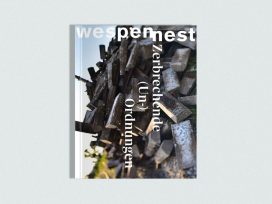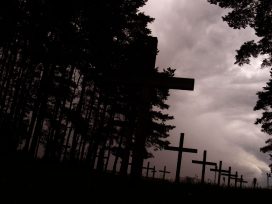In a rush to minimize the recession following COVID-19, some hold their economies dearer than the saving of lives. But prosperity isn’t the indefinite depletion of bodies and resources. It is through the satisfaction of basic needs that we will restore the dignity of all.
COVID-19 has confirmed certain intuitions that have been raised many times, although always ignored, over the course of the last half-century. The first concerns the status and position of the human species within the vastness of the universe. We are not the only inhabitants of earth, nor are we set above other beings. We are criss-crossed by fundamental interactions with microbes and viruses and all sorts of vegetal, mineral and organic forces. More accurately, we are partly composed of these other beings. But they also decompose and recompose us. They make and unmake us, starting with our bodies, our environments and our ways of living.
The pandemic has revealed not just the complexity and fragility of the structure and content of human civilizations, but the vulnerability of life itself, in all its anarchy and diversity – from the bodies that house it and the breath that diffuses it, to the nourishment without which it would wither away. This fundamental vulnerability is the very essence of humanity. But it is shared, to varying degrees, by every creature on this planet – a planet that powerful forces threaten to render inhospitable, if not uninhabitable, to the majority of living things.
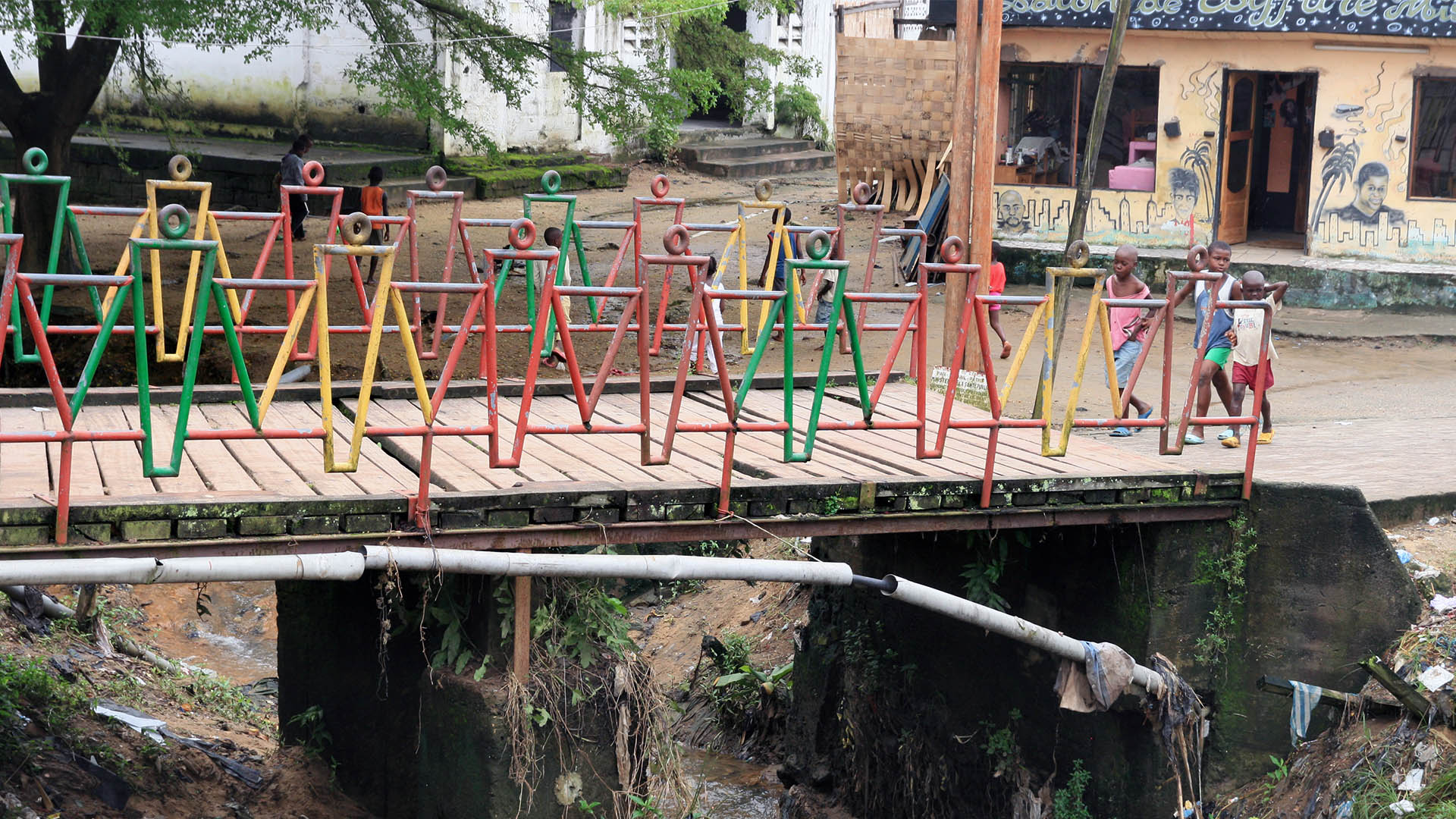
Bessengue Douala. La passerelle (the small bridge) by Alioum Moussa. Photo by Sandrine Dole from Wikimedia Commons.
A planetary chain
But the pandemic has also laid bare the disorder, violence and injustice that structure the world. Despite scattered progress, the ‘perpetual peace’ that Immanuel Kant hoped for remains a mirage for most people. Now as ever, the sovereignty and independence of countless nations are ultimately protected and guaranteed by war, in other words: the possibility of the disproportionate spilling of blood. This is what is known euphemistically as the ‘balance of powers’. The establishment of an international system of solidarity with a power structure that transcends national sovereignties is still a long way off. At the same time, the idea of a return to autarchic empires is nothing more than a fantasy.
Meanwhile, a whole constellation of forces that are as much physical or natural as they are organic or mechanical – including technology, the media and the financial markets – are busy weaving a lattice of fractures between every part of the world.
A planetary chain that ignores (and paradoxically relies on) state borders and has no relation to official cartographies is currently gaining shape and strength. Made up of intertwinings and interdependences, it is not the same as ‘globalization’, at least in the sense of the term since the fall of the Soviet Union. It is rather an exploded whole: networks, flows and circuits that constantly dissolve and re-form at varying speeds and on multiple scales. This whole emerges out of many different entanglements, not least between inhabited areas and wildernesses and their respective boundaries. The weave of the world is composed of numerous extremities and a multitude of large and small nuclei. Nothing is outside it. Everything serves, at one point or another, as a relay in the rapid circulation of all types of flow.
Of course, not everything moves to the same rhythm. But planetary existence in all its manifestations (terrestrial, marine, aerial, orbital, fibreoptic) is now ruled by motion and speed. It is not just capital flows that move. Humans, animals, pathogens and objects are also mobile, as are all sorts of goods, data and information. Raw materials are extracted in one place and refined in another. Components are assembled into goods somewhere else again.
As discontinuous as they seem, the pathways things follow are often the same, moving from the crudest tangibility to the most ethereal abstraction. We are witnessing the gradual development of planetary complexes that operate at various scales and across networks that are more or less spatially fragmented.
Forbidden blood
COVID-19 has exposed one of the tragic underpinnings of any political order, and without doubt, the one that we are most inclined to forget. To guarantee the continuity of the political community, lives may need to be sacrificed. But which lives? And sacrificed by whom, when, why and under what conditions?
There is no human community that does not have, at its foundation, a concept of ‘forbidden blood’ – blood that can only be spilt in certain circumstances. Whether united by origin, religion or race, all communities are collections of profoundly dissimilar people. The blood prohibition is like a protective spell against internal conflict. It allows members of the community to coexist without killing each other.
Ultimately, what distinguishes one human community from another is how it responds when its existence is threatened. In other words, how it tackles the conundrum of which lives should be discarded to ensure that the life of the community does not stop altogether. Is there any way to perform such a sacrifice that does not lead to either the escalation of internal disputes or the dissolution of social ties and the total eradication of the political unit?
In the not so distant past, epidemics and famines made this dilemma one of the most important sovereign decisions. Wars were the archetype of these historic events that required the sacrifice of some lives so that others could continue or even flourish. Cataclysmic conflicts demanded the ruthless use of force. The aim was to kill enemies accused of threatening the community’s ongoing existence. But war being what it is – a generalized exchange of death –, pursuing an enemy means risking being attacked in return.
Lives to be spent
From the nineteenth century, the enumeration and weighing of lives – and thus the redistribution of sacrificial possibilities – was primarily a matter of economics. Karl Polányi remarked that the economy, particularly trade, had not always been associated with peace. In the past, he explained, ‘the organization of trade had been military and warlike; it was an adjunct of the pirate, the rover, the armed caravan, the hunter and trapper, the sword-bearing merchant, the armed burgesses of the towns, the adventurers and explorers, the planters and conquistadores, the man-hunters and slave-traders, the colonial armies of the chartered companies’.1
Nowadays, lives are not weighed against the moral obligation attendant upon an individual’s place in society. They are weighed according to a series of calculations. These calculations all follow from a single faith and a single creed. Society no longer has any autonomy as such. It has become a mere appendage to the market.
This is both the great dogma and the great wager of the present day. According to the terms of the wager, the gains and profits acquired through trade (or sometimes through conquest) always outrank any other human motive. There is no gain other than that derived from the sale of some item. Life is governed by market prices.
Every human life is a probability, and the calculation of lives resembles the calculation of probabilities. In this calculation, the only thing that counts is efficiency. Life exists only to the extent that it can be spent. To guarantee the survival of the many, we must agree to jettison the lives of the few.
As the Anthropocene marks our passage into a new, viral and pathogenic age, the question of how to identify which bodies might contaminate the community and which lives must be offloaded in order to ensure the survival of the many, is poised to become the principal political concern for the foreseeable future.
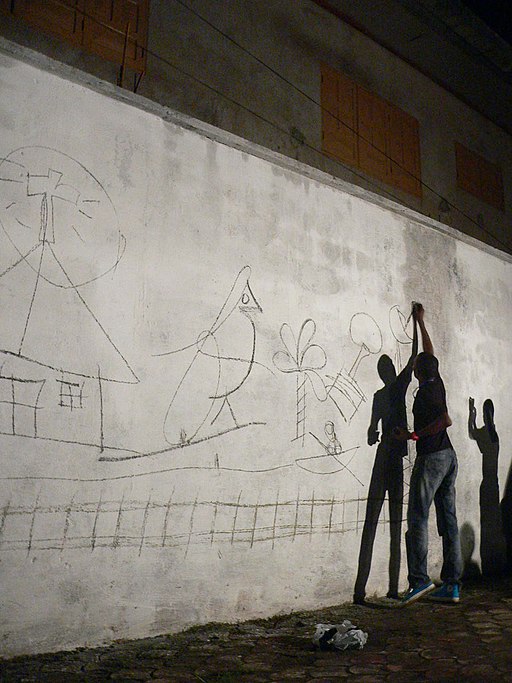
Alioum Moussa’s performance during UD Salon Urbain de Douala 2010. Photo by Sandrine Dole from Wikimedia Commons.
The right to a future
The most serious problem is global warming caused by humanity’s emission of greenhouse gases. These are the atmospheric concentration of carbon dioxide, nitrous oxide and methane, not to mention the ultrafine dust, toxic emissions, invisible substances, tiny granules and all sorts of particulate matter. Soon there will be more carbon dioxide in the atmosphere than oxygen. In Africa specifically, the greatest concern is the depletion of fish stocks, the degradation of mangrove swamps, the increasing levels of nitrate pollution and the deterioration of coastal zones. It is also the sell-off of forests, the excessive use of agrochemicals, human encroachment onto natural land, the loss of rare species – in short, the destruction of the biosphere.
None of this is the result of chance. On the contrary, it is the inevitable outcome of the extraction and squandering of the earth’s resources, a paradigm that can be maintained only by the constant and uninterrupted combustion of fossil fuels in a planetwide technological and industrial network. Humanity will not survive if we continue to rely on the continuous consumption of vast quantities of energy that must be sourced from ever deeper inside the bowels of the earth.
The current state of the earth means that events like COVID-19 are likely to happen again in the relatively near future. Thanks to the industrialization of meat markets, the intensification of relationships between humans and other species, the expansion of monoculture and the climate catastrophe, we are facing the imminent risk of new pandemics. Because any of these could ultimately result in our demise, each will provoke intense fear accompanied by bursts of irrationality. The question of the right to exist, the right to breathe and the right to a future will become even more pressing.
The right to exist
The right to exist will be increasingly inseparable from its opposite: the hunt for carriers of infectious germs – in other words, the identification of who to sacrifice for the sake of everyone else’s survival. The great danger is that these apparently health-based decisions will end up jeopardizing the lives of undesirables. This risk is inherent both in the novel economic forms now emerging, and in the techniques of government made possible by the pandemic.
Necessary as they are, the technologies deployed during the crisis do not in themselves eliminate the danger. On the contrary, it would be easy to invoke health reasons to justify their use against any human being deemed to be a biological risk. Many sovereign functions properly performed by state agencies are already being outsourced, particularly to giant corporations and technology companies in sectors like artificial intelligence, quantum science, hypersonic speed and technologies for localization, capture and tracing.
This raises numerous questions with no satisfying answers, at least for the moment. If reality can now only be described or represented using numbers and abstract codes, and if codes and numbers seem increasingly to be taking on the dimensions of a cosmogony, how can we ensure that the logic behind the counting and weighing of lives does not become a logic of elimination and erasure?
In this era of unbounded calculation, are we dealing with absolute certainties, or probabilities and hence wagers? What does immunity mean if measuring the risk is the same thing as quantifying the chance? How can we recognize the signs of a state turning against its own population instead of ‘protecting society’?
At first sight, the corona lockdown was about saving lives and avoiding anyone being sacrificed unnecessarily. In reality, however, there was always going to be a price to pay, both as a whole and at the individual level. Economic activity may have slowed overall, but countless sweatshops are still operating. Warehouses, data centres, industrial farms, meat processing plants and other apparatuses of digital capitalism have all remained open.
Many people have lost their jobs, their livelihoods, even their lives. The public treasury has been depleted. A recession has been declared. International debts have been incurred and our children’s future has been mortgaged. In the world’s poorest areas, the lack of insurance or assistance during temporary or sustained periods of poverty and deprivation is a structuring element of the daily struggle to survive.
The right to breathe
Even in normal times, equality before death is a myth. The right to exist is meaningless unless it is accompanied by its corollary, the right to subsist. Food can only be acquired by leaving the house and, often, travelling long distances at increasingly great expense (unreliable transport, interminable journeys on foot, all sorts of permits and authorizations). The hunt for food is an endless cycle of walking, hustling, haggling, bargaining, moving on, using all means possible, even illegal ones.
The ability to move freely and travel around is a prerequisite for access to food and provisions. So is the ability to plug into networks of social solidarity, to accumulate allegiances and affiliations, to convert temporary arrangements into the resources required for permanence. Physical encounters, gatherings of people in close proximity, direct contact with other humans, even overcrowding – without these the daily battle to survive would be lost before it began. It is won not in isolation but by people coming together.
In these circumstances, forced immobility is not just a form of punishment. It is also a way to expose a significant proportion of the population to enormous danger. The poorest members of society, who have no safety net and nobody to take care of them, can now no longer even take care of themselves. Under lockdown, the most vulnerable people are confronted by a still more dramatic choice: obey the instruction to stay at home, respect the law and starve to death; or defy the law, go outside and risk catching the disease.
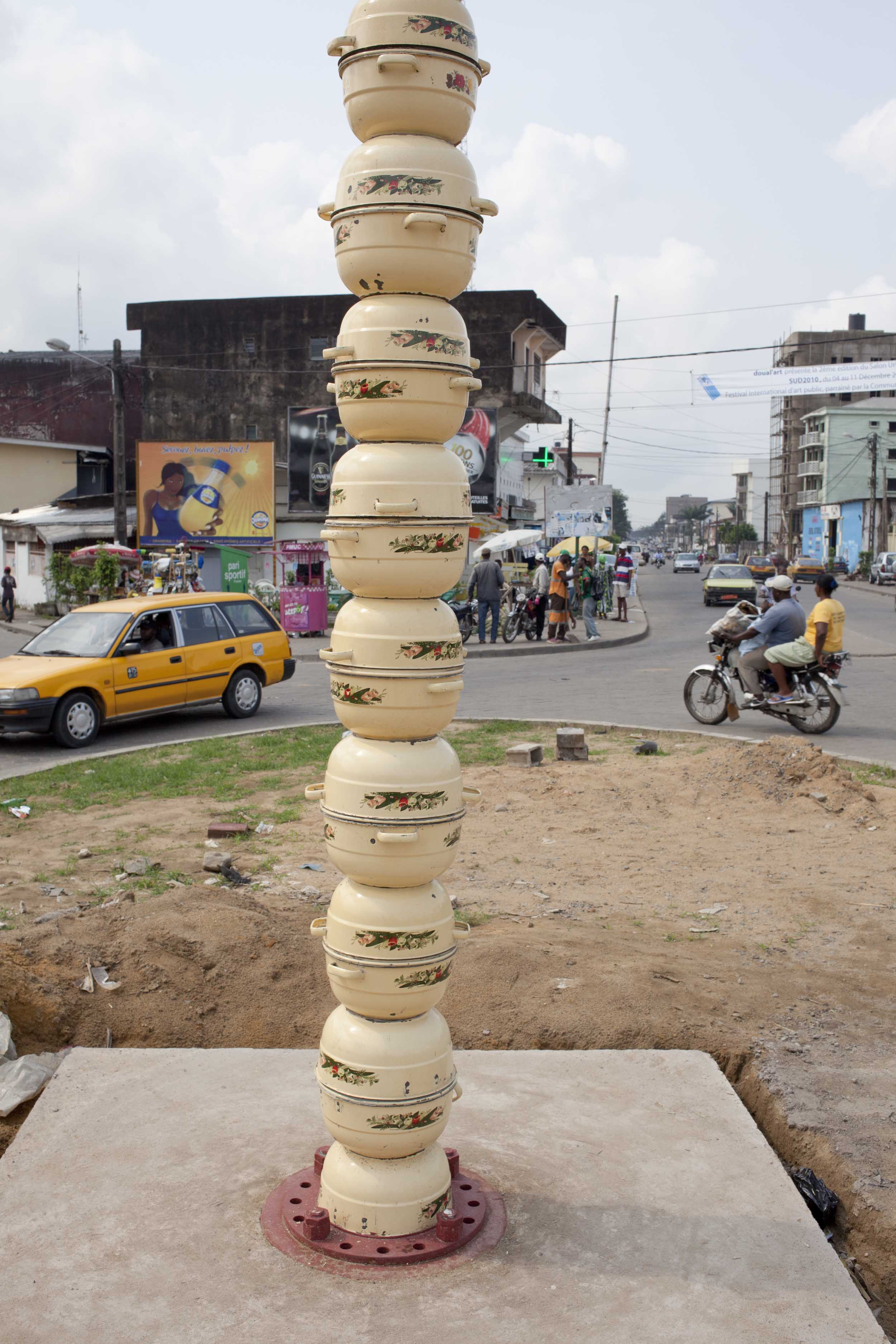
Located in the heart of a roundabout in New Bell of Douala, La Colonne Pascale consisted of pots in Vitreous enamel, which were used in the past by the housewives to protect the food and the drinks. Pascale Marthine Tayou, La Colonne Pascale, Douala, 2010. Produced for the SUD Salon Urbain de Douala 2010 / Photo by Lard Buurman Courtesy doual’art / Wikimedia Commons.
The market calculus
Although the choice once lockdown is lifted is no longer between the virus and starvation, the dilemma is no less acute. From the standpoint of market forces, the economy must be restarted, even if it means some loss of life. The calculus is as follows: only a tiny percentage of the total population will die as a result of the pandemic; those people, who are mainly unemployed or unemployable, would have been hit sooner or later anyway, killed by the virus or other comorbidity factors. Trying to keep them alive at any cost is not just expensive. The price of their survival will be the loss of many more lives. Economic ruin would lead to societal breakdown; the cost is therefore unacceptable. On that basis, they should be allowed to die immediately.
From a market perspective, the right to exist and the right to subsist are entirely dependent on financial speculation and so fluctuation. Just like food, a living must be earned, and nobody can earn one by being idle. One way to earn a living is to work for a salary. In practical terms, the right to life is reserved for those who obtain it through a salary, a job or work. The fact remains, however, that many people simply cannot find paid employment. Their bread and butter must be cobbled together under conditions of hazard and uncertainty.
COVID-19 has thus exposed various types of human and social degradation and economic subjection. In the age of digital capitalism, there is no guarantee that labour power offered for sale will be bought. Work still has a market value. But there is less and less paid employment to go around.
This is particularly true where the virus is affecting societies that were already vulnerable, in the process of disintegration or suffering under the yoke of tyranny. In these parts of the world, government by neglect and omission is the rule. They are the site of the most brutal experiments (including medical ones) at the intersection of life and non-life. The market economy in such areas is oriented around expenditure, wastage and disposal. In this context, sacrifice does not necessarily mean gratuitous murder. Deep down, there is nothing sacred about it. It is not intended to win the favour of some divinity. It requires people to present themselves for counting, tallies to be performed, measurements to be made and lives to be weighed, with those deemed not to count discarded.
These policies of disposal seem to be part of the normal order of things, so self-evident as to need no further thought. The question now is when the decision will be taken.
When will we decide that such a sacrifice is socially unacceptable? When will we come back to the idea that it is life that is invaluable, and thus fundamentally beyond the reach of any form of measurement? Life cannot be counted or weighed. It is, simply, incalculable.
What is to be done?
At this point, we must pause, open our eyes, allow ourselves to feel shaken, and then take a step back. Tomorrow cannot simply be a repetition of yesterday. What Africa needs is a ‘great transition’.
We must strike at the root of the social, political and economic system of extraction and predation. Prosperity does not mean the indefinite depletion of human bodies and material resources. It is about the quality of social ties, about restraint and simplicity. What we need is deceleration and withdrawal. We must work together to re-localize the economy through small-scale actions. For it is through the satisfaction of basic needs that we will restore the dignity of all. Rehabilitating localness means supporting the sorts of place-based resilience that Africa is already brimming with.
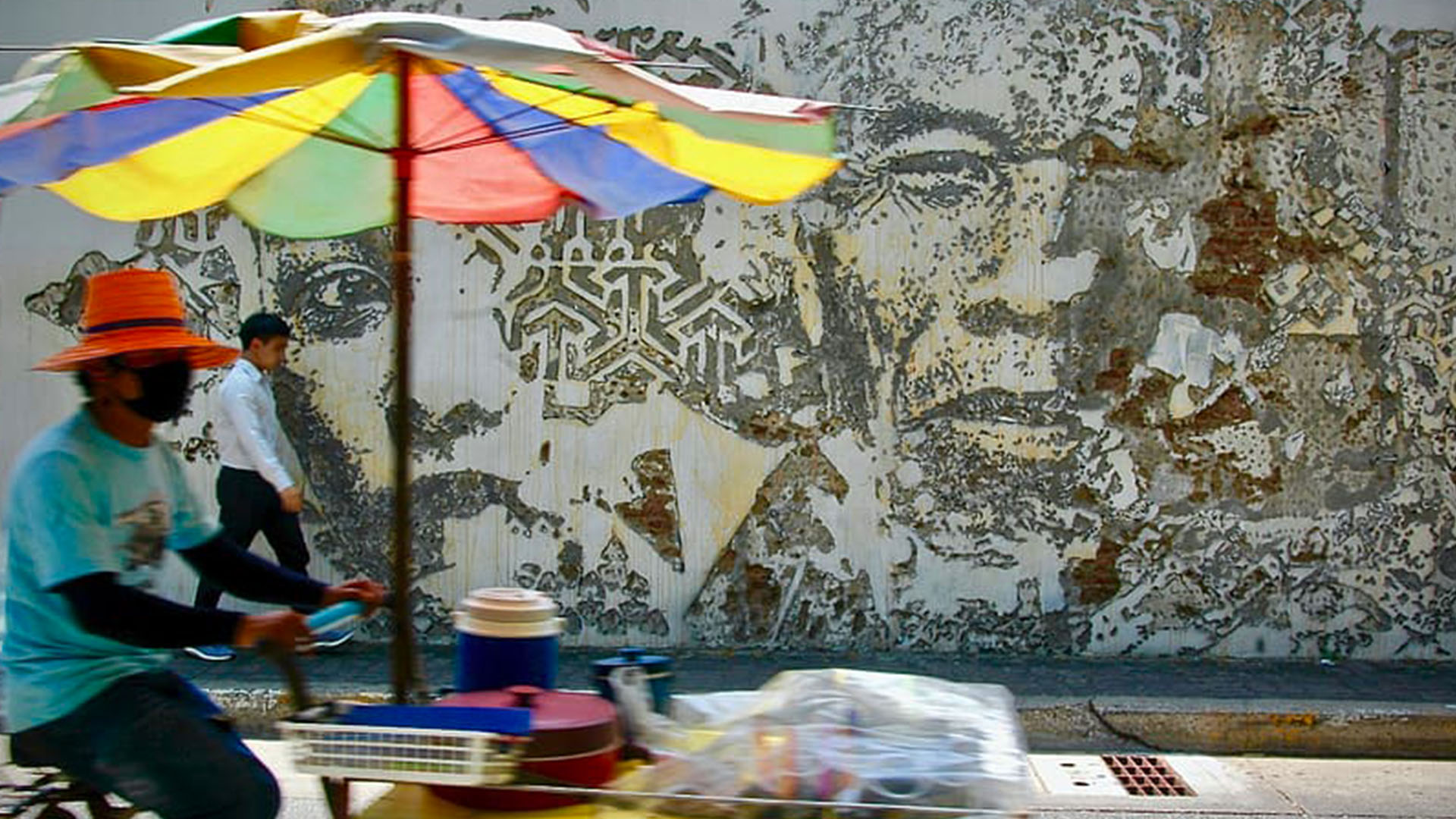
Photo via Piqsels.
Especially since the nineteenth century, Africa has developed hybrid forms of organization in production and trade. This is a strength, not a weakness. The continent has largely escaped total domination by capital and the state, two powerful modern forms for which it has been a constant thorn in the side. We must turn to communities and their institutions, to their memories and knowledge, to their collective intelligence. In particular, we must learn how they used to, and still do, distribute the resources needed for human self-reproduction.
Alongside official society, with its internal hierarchies, there have always been peer societies. In these spaces of the commons and ‘in-common’, resources are managed participatively through open, contributory systems that go far beyond taxation. These peer societies are governed by the dual principle of mutuality and social negotiation. Welfare benefit associations are just one example. The ‘informal economy’ demonstrates that many social agents feel driven to create something that can be directly useful to other contributors. They make a living by producing added value for the market. Beyond exchange, it is the development of these productive communities that should be encouraged.
The great transition
Africa must, of its own volition, begin a ‘great transition’. The goal of this transition will be to create the conditions for social reinforcement and social investment. The balance between the market and the state, and between the state and society, needs to be adjusted in order to foster mutualization. For a very long time, the state has been dominated by predators who use their power within the bureaucracy to maximize their personal gain. As it stands, the state invests almost nothing to maintain or strengthen the generative capacities of communities.
We must move away from a relationship with the state that is based exclusively on extraction and predation, and instead imagine a relationship that is productive and socially beneficial. The scales must be tipped in favour of the productive classes of society, rather than the bureaucracy and – formal or informal – armed forces. New technologies have unlocked the ability to communicate via the digital medium. As long as digital media are used to develop critical faculties, to increase the capacity for self-organization, and the capacity to create and redistribute value, this ability can be leveraged for the benefit of the productive class and the detriment of rent-seekers.
Reinventing sovereignty
Finally, it will not be enough to reinvent the economy. We must also reimagine democracy. Governing does not just mean providing social security against crises and risks of all kinds. It also means ensuring that interactions between all living things in our environments are as harmonious as possible. This must be the foundation on which we establish a new social contract, one that includes all the non-human inhabitants of the planet, as individuals and as species.
The very idea of sovereignty must be reinvented. In the future, the ultimate sovereign authority must be the ecosystem itself. This was the case in precolonial African societies, where human rule involved constant care that the ecosystem remained in equilibrium. Truly human societies were those that knew how to embrace all other environments and species.
K. Polányi, The Great Transformation: The Political and Economic Origins of Our Time, Boston, Beacon Press, 2001 [1944], p. 15-16.
Published 6 July 2020
Original in English
Translated by
Isabelle Chaize
First published by Eurozine
© Achille Mbembe / Isabelle Chaize / Eurozine
PDF/PRINTIn collaboration with
In focal points
Newsletter
Subscribe to know what’s worth thinking about.
Related Articles
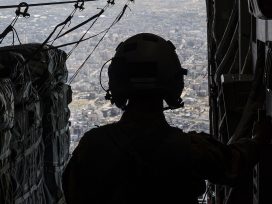
The Schrödinger’s Cat thought experiment, when applied to human rights, suggests a world of deteriorating accountability. Can the United Nations and other overseeing bodies rectify the paradox of international law’s existence yet the frequent disregard for its edicts?

Europe and its victims
Beyond the myth of national sovereignty
Europe has learnt the need to protect human dignity as inviolable, refuting the myth of national sovereignty and ethnically-based citizenship. But it also embraces these principles as forms of emancipation for Jews and previously colonized nations. This inconsistency endangers both Europe and its past victims.




